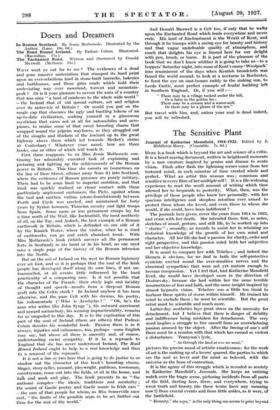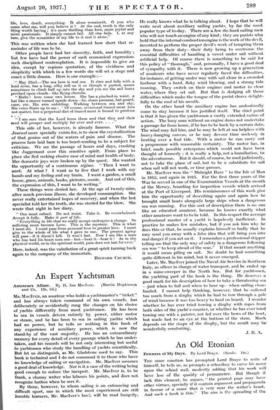The Sensitive Plant
HERE is a book which is beyond the art and science of a critic. It is a heart-searing document, written in heightened moments by a rare creature inspired by genius and disease to acute vision. Flash after flash the lightning scenes come from her tortured mind, in each minutae of time created whole and perfect. What an artist this woman was ; conscious and sensitive in every fibre of her multiple self ! It is a life-widening experience to read the small amount of writing which time allowed her to bequeath to posterity. What, then, was the privilege of those people who knew her personally, with her spacious intelligence and sleepless intuition ever armed to protect those whom she loved, and even those to whom she would, if she could, have been indifferent ?
The journals here given, cover the years from 1914 to 1922, and cease with her death. She intended them, first, as notes, sketches of mood, gesture, and still life, to be worked up into stories " ; secondly, as records to assist her in retaining an historical knowledge of the growth of her own mind and character. All her life she had a passion for clarity, order and right perspective, and this passion ruled both her subjective and her objective knowledge.
It is usual to compare her with Tchehov ; and indeed the likeness is obvious, for we find in both the self-protective cynicism erected round the over-sensitive nerves and the abnormal sympathies that were not yet mature enough to become compassion. Yet I feel that, had Katherine Mansfield lived, she would have developed more in the direction of Dostoevsky, because she had within her the same terrible insurrections of fear and faith, and the same insight inspired by almost hypnotic vision. Tchehov was a little too timid to harbour these spirits of storm within himself. He trained his mind to exclude them ; he musl be scientific. But the great artist must be scientific and much more.
Latter-day aesthetics lays great stress on the necessity for detachment, but I believe that there is danger of debility and indifference being mistaken for detachment. The very word implies a struggle to free oneself from an overwhelming passion aroused by the object. After the freeing of one's self there must be a reunion with that which has caused so violent a disturbance. Tennyson's lyric,
" As through the land at eve we went," pictures the precise mood of artistic creativeness ; for the work of art is the making up of a lovers' quarrel, the parties to which are the soul as lover and the mind as beloved, with the universe as the bone of contention.
It is the agony of this struggle which is revealed so acutely in Katherine Mansfield's Journals. She keeps an untiring watch over the tragic scene, picturing incidents from all parts of the field, darting here, there, and everywhere, trying to wrest truth and beauty (do these terms have any meaning now ?) from crucial events and from little asides, as it were, of the battlefield.
" Honesty," she says, " is the only thing one seems to prize beyond
life, love, death, everything. It alone remaineth. 0 you who Woe. after me, will you believe it ? At the end, truth is the only thing worth haying ; it's more thrilling than love, more joyful and iinore paseionate; It simply cannot fail. All else fails. I, at any inte, give the remainder Of my life to it and it alone."
This was written when she had learned how short that re- Mainder of life was to he.
Other people have had her sincerity, faith, and humility ; , .
134 few hai,e had the power of such economical expression. such disciplined contemplation. It is impossible to give an idea, except by copious quotation, of the vividness and
simplicity with which in a few s one she will et a stage and
enact 'a, little drama. H o
Here is ne example
".`.14g.y,22nd.—The sea here is real sea. It rises and falls with. a loud noise, has a long, silky roll on it as though it purred, seems sometimes to climb half up into the slcy and you see the sail boats perched upon clouds—like flying cherubs. - - " Halo ! here come two lovers. She has a pinched-in waist, a hat like a saucer turned upside down—he, sham panama, hat-guard, cane, etc. His arm enfolding. Walking between sea and sky. His voice floats up to me : Of course, occasional tinned meat foes not matter, but a perpetual diet of tinned meat is bound to produce
• • " I am sure that the Lord loves them and that they and their seed will prosper and multiply for ever and ever. . . . '
This side of her, however, is already famous. What the Journal more specially exists for, is to show the crystallization of that genius out of the waters of pain and disease. The process here laid bare is too heart-rending to be a subject for criticism. We see the passage of hours and days, crashing like Juggernaut over this sensitive spirit. From place to place she fled seeking elusive ease-of mind and health of body. Her domestic joys were broken up by the quest. She wanted the opportunity of a continuous regime. " Then I want to work. At what ? I want so to live that I work with my hands and my feeling and my brain. I want a garden, a small house, grass, animals, books, pictures, music. And out of this, the expression of this, I want to be writing."
• These things were denied her. At the age of twenty-nine, after much previous illness, she developed consumption. She never really entertained hopes of recovery, and when the last specialist told her the truth, she was steeled for the blow. She wrote that night in her diary.
" One must submit. Do not resist. Take it. Be overwhelmed. Accept it fully. Make it part of life.
"Everything in life that we really accept undergoes a change. So suffering must become Love. This is the mystery. This is what I must do. I must pass from personal love to greater love. I must give to the whole of life what I gave to one. The present agony will pass—if it doesn't kill. It won't last. Now I am like a man who has had his heart torn out—but—bear it—bear it ! As in the physical world, so in the spiritual world, pain does not last for ever." Here, indeed, was the valediction of a great spirit turning back again to the company of the immortals.
RICHARD CHURCH.



































 Previous page
Previous page